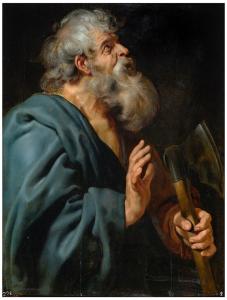Did you know the Bible names over twenty different apostles? This is surprising to many, especially those who believe there were only twelve apostles for all of time. While there were twelve to start who were closest to Christ, there were at least seventy in Jesus’ earthly walk, although we don’t have all their names. After the resurrection, there were a number of other apostles at work in the early church, including several women. Still, there remains a “lost apostle” among the twelve: the Apostle Matthias, who the eleven apostles chose to replace Judas after the resurrection.
Who was Matthias? Did he do the same things as the other apostles, or did he serve a different purpose? Read on to learn more about the Apostle Matthias.
Who was Matthias?

As little information we have about some of the twelve, we have even less about the Apostle Matthias. Most believe he was born in Jerusalem in the first century. Most likely, he was part of the seventy (or seventy-two, depending on translation) disciples sent out by Christ in Luke 10:1-4:
After this the Lord appointed seventy-two others and sent them two by two ahead of Him to every town and place where He was about to go. He told them, “The harvest is plentiful, but the workers are few. Ask the Lord of the harvest, therefore, to send out workers into his harvest field. Go! I am sending you out like lambs among wolves. Do not take a purse or bag or sandals; and do not greet anyone on the road. (NIV)
According to Acts 1:21-22, Matthias had been a follower of Jesus throughout His entire ministry, and was also a witness of the resurrection.
Therefore it is necessary to choose one of the men who have been with us the whole time the Lord Jesus was living among us, beginning from John’s baptism to the time when Jesus was taken up from us. For one of these must become a witness with us of his resurrection. (NIV)
They cast lots to allow God to choose the apostle, and Matthias was the choice. Aside from this information, we know nothing about his life.
Matthias’ ministry
Outside of Matthias’ appointment to the apostolic, he isn’t mentioned anywhere else in the New Testament. Within his ministerial history, there is question to his identity. Throughout church history, he has been identified with Barnabas, Nathaniel, and Zacchaeus. One early church writer called him Tolmai, not to be confused with Bartholomew. It’s unlikely he was an alternate identity for someone else. From what we know of his ministry, he worked throughout Judea, Aethiopia (modern-day Georgia), and possibly Ethiopia. There are multiple martyrdom accounts, all happening around 80 AD. According to one legend, he was crucified in Colchis (Aethiopia) among a region of cannibals. Still, another legend says he died in Sebastopolis, among a region of barbarians and meat-eaters (probably cannibals). Both claim he was buried in their lands. A third account says he was stoned and beheaded in Jerusalem. Another account says he died of old age in Jerusalem.
Non-canonical writings
The Apostle Matthias is an apocryphal figure. As apocryphal writings tend to favor uncommon Bible figures, it’s not an accident he’s featured in non-canonical text. However, it’s unlikely he had any hand in these documents.
Summary
The little we know about the Apostle Matthias tells us much about him. For one, he was devoted to Christ from the beginning, all the way to the resurrection and beyond. As a result, his dedication shows us that he saw Jesus for Who He was, and knew he needed to pursue this ministry, anywhere it took him. It’s also worth mentioning that Matthias followed Jesus as an unknown throughout all of Jesus’ earthly life, still intent on going wherever the Gospel took Him. While the twelve moved forward and gained notice for their work, Matthias remained in the background, likely doing many of the same things. This shows a true commitment to assignment, even if it didn’t gain much visible attention for a long time.
Additionally, Matthias allowed God to show his heart to the apostles through the process they devised. Rather than send a long resume or petition to be chosen, he allowed God to make room for him in due time. Even though we live in a different time where our systems of handling matters is quite different than it was back then, God can still show His true leaders to others if we give Him the chance to do so.
Conclusion
The Apostle Matthias shows us that trust in God is more than lip service. Humble submission can go a long way to transform any situation, raise us up, and move us to great things in ministry.
“For,” said Peter, “it is written in the Book of Psalms:
“‘May his place be deserted;
let there be no one to dwell in it,’
and,
“‘May another take his place of leadership.’
Therefore it is necessary to choose one of the men who have been with us the whole time the Lord Jesus was living among us, beginning from John’s baptism to the time when Jesus was taken up from us. For one of these must become a witness with us of His resurrection.”
So they nominated two men: Joseph called Barsabbas (also known as Justus) and Matthias. (Acts 1:20-23, NIV)

















